Virus, science, and more
on the scrapheap

‘We follow the science’. That or something like it has been the politicians’ mantra. But there is no such thing as “the science”. There are well-informed. clever people who pursue research, ranging from specialist modellers of probabilities and possibilities to racing researchers set on the holy grail of a vaccine. We hear that vaccines are not far away. We hear that a vaccine is never going to do the job against this ‘clever’ virus. We hear that we will be out of the wood (according to various timescales) or that we will have to live (and die) with the virus for the foreseeable future. We are told that people with antibodies are safe. We hear that we do not know whether we can acquire immunity from a second infection. With a such a new and unpredictable virus, there are huge uncertainties. Translating these uncertainties into policies is the politicians’ job. When they get things wrong they get the blame (unless their name is Trump). But the scientists should also share the blame. They appear on the media (flattered and self-important) to make ex-cathedra pronouncements based on their particular skill-sets. “The evidence tell us…”. Evidence only tells us something there is a theory and/or a set of assumptions. I am concentrating on what is actually happening, listening to the news and hearing the main scientific pronouncements, but the rest seems to me to be media noise. Hooray for Radio 3. Science is hugely powerful and very necessary, but “science” tells us many things. Which of these things do we “follow”? There will be huge winners and losers in this game of scientific snakes-and-ladders.
A footnote on the Sumption survival of the fittest thesis.
State what seems to be unassailable premise: ‘old people are more likely to die that younger ones’. What flows from this, by a series of steps which have the air of logic, is that if everybody cannot be treated, the old should not be.
But the initial premise has tacit assumptions/biases in it. The ‘old’ are singled out, not infants, pregnant mothers, the disabled, those on social care, those in care homes, those with severe mental problems… The only outcome of the premise is that the old should be left to die.
If I start from the ethical premise that everyone has the same right to a further year (on other unit of time) of life and be given assistance to achieve that goal (unless the quality of life is such as to bring this into question), the outcome is utterly different. At the end of the year, the same equation kicks in. The old will of course on average die more quickly than younger people , but a caring society should not pursue remorseless if tacit policy to cleanse of society of old people.
Of course, I am biased in this. My birth certificate tells me that I am “old”. I would like to think this is fake news, but it seems to be true.